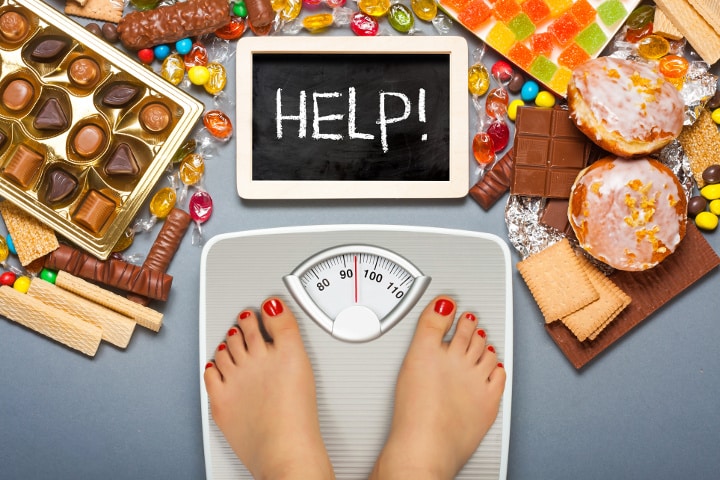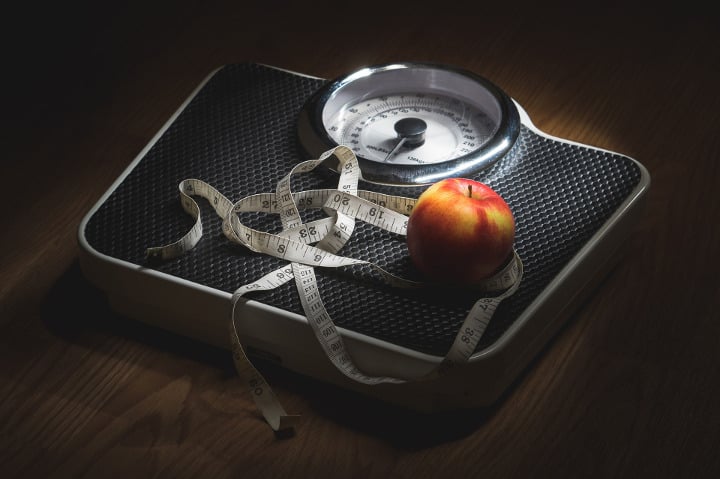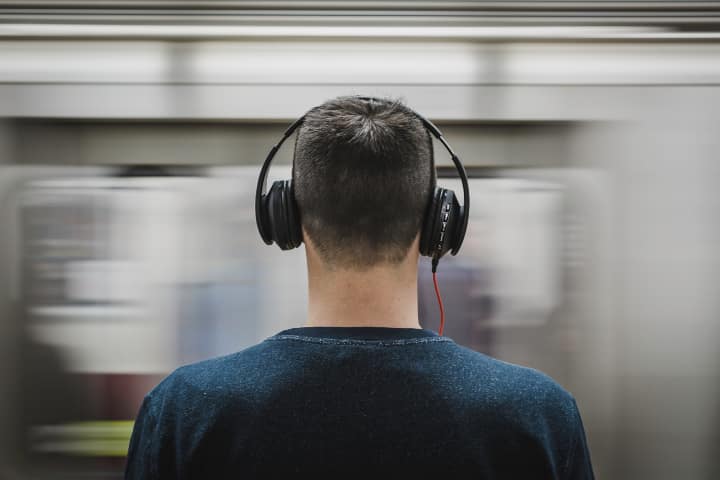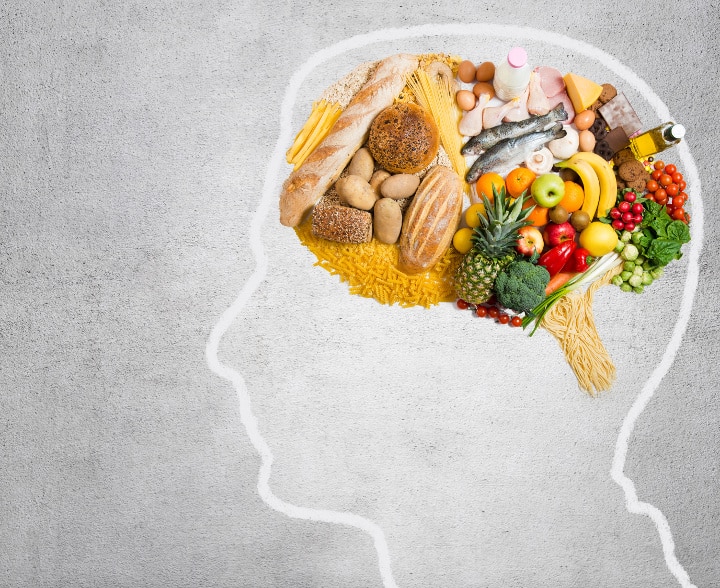Hypnosis for Weight Loss (The Complete Guide)

Like so many others, you may have tried everything you can think of to lose weight. Low-fat diets, low-carb diets, juice fasts, weightlifting, cardio—you name it. But, despite all your best efforts to follow a strict regimen and reduce the number on the scale, nothing works.
And, like so many others, you may blame and criticize yourself, certain that there must be something wrong with you. You feel increasingly down and defeated.
And, in an attempt to feel better, you revert back to old eating habits that only make you feel even more sick, exhausted, and powerless.
Even when you do manage to lose weight, you eventually gain it back—and then some. You may feel as though you’re stuck in a hopeless cycle.
Somewhere along the way, you may have heard that hypnosis can help. Still, you’re skeptical. Could weight loss hypnosis actually work?
We often hear people talk about hypnosis in one of two ways: a party trick or mind control. But, in truth, it is neither. And, many studies have shown it can be effective for weight loss, quitting smoking, and a variety of other serious issues.
According to The Journal of Consulting and Clinical Psychology, one study found that those who tried to lose weight with hypnosis lost double the weight of those who tried without. Another study from The International Journal of Clinical and Experimental Hypnosis found that hypnosis helped people lose weight, improve their BMI, positively change eating behaviors, and feel better about their bodies overall.
The science shows that hypnosis works. But, what exactly is it? And how does it work?
Curious if hypnosis could help you lose weight?
Take our hypnotizability test and find out!
What Is Hypnosis?
You’ve probably seen hypnosis depicted in the movies, on TV, or in books or magazines. Most likely, you saw the hypnotist—maybe dressed like an eccentric magician—wave a pocket watch and chant something like, “You’re getting sleepy, very sleepy.” Then, suddenly, the hypnotist had the power to control and direct the other person’s thoughts.
This is not how hypnotism works in real life. There will be no swinging pocket watch, mind control, or air of enchantment. And, there’s no magic switch that can suddenly turn off your cravings.
Hypnosis is a real medical and psychological technique that has been proven to help people take control of their lives.
In a world full of diet and wellness fads, it’s important to note that hypnosis is anything but. The ancient Greeks and Egyptians used hypnosis for medicinal purposes thousands of years ago. According to the University of Maryland Medical Center, “Hypnotherapy regained popularity in the mid-1900s due to Milton H. Erickson, a successful psychiatrist who used hypnosis in his practice.” In 1958, the American Medical Association and the American Psychological Association both recognized the validity of hypnotherapy.
You may be surprised to learn that you’ve likely entered a hypnotic state before.

Have you ever zoned out while driving on the highway, only to find that you reached your destination without fully realizing it? (Note: please stay completely alert on the highway!) Or, have you ever drifted off into a daydream and suddenly come up with a surprising idea or new solution to a difficult problem?
Hypnosis is a lot like those experiences. You will enter a guided trance state. Overall, the goal is to help you access your subconscious mind, better understand your deepest wants, and change your perspective so you can creatively problem-solve.
The new ideas you encounter will not disappear when you leave the hypnotic state. Instead, they will stay with you, held in your subconscious mind, guiding you toward healthier, more empowered decisions.
How Does Hypnosis Work?
Ninety percent of our thoughts are subconscious–a result of past experiences that continue to affect how we think, feel, and respond to challenges. Some of this subconscious programming serves us well (“I’m happiest when I’m exercising”). And, some of it is counterproductive (“Eating ice cream makes me feel better, and I deserve it because I had a hard day”).
The subconscious mind is not analytical, logical, or rational. Those subconscious “programs” may be outdated, and out of alignment with your conscious desires.
Hypnosis is a process of relaxing the conscious mind in order to communicate more directly with the subconscious mind and change subconscious thoughts. Once the subconscious programming is changed to better align with your conscious desires, changing your behavior becomes much simpler.
The Science of Hypnosis
During hypnosis, repeated images and messages will coax you into a state of deep relaxation. Then, you can access your subconscious mind, explore significant memories, and tap into the thoughts that dictate your behaviors. You can observe your thoughts as though from afar, recognizing that they neither define nor control you.
You can also become more receptive to new ideas and internalize messages that you may have struggled to completely accept before (e.g., “It is possible for me to lose weight.) As you take control of your subconscious mind, you can also take control of your choices and overall life.
Science has recently shed light on exactly how and why hypnosis works.
In 2016, researchers at the Stanford University School of Medicine performed brain scans during hypnosis sessions. According to Dr. David Spiegel, they were the first to investigate what is happening in the brain during hypnosis.
Here’s what they found:
- Decreased activity in the dorsal anterior cingulate, which means you stop worrying about anything that’s happening outside the hypnosis session.
- Signs of increased brain-body connection “that helps the brain process and control what’s going on in the body.”
- Signs of “dissociation between action and reflection,” which means you are able to absorb new messages and enact them without overthinking them.
Brain scans of people imagining an event show that the same parts of the brain are activated as when they are really at the event. By visualizing the desired behavior and associating positive feelings with it, you can make previously unappealing behaviors more familiar and comfortable.
These findings confirm everything hypnotherapists have already known. Hypnosis allows you to let go of self-consciousness, completely focus on the problem at hand, fully understand your experience, and make real, productive changes in your waking life.

Common Questions About Hypnosis
You might still have questions about how hypnosis works for patients.
Is the Change Immediate?
Hypnosis reaches the deepest parts of your mind, where you hold past traumas, secret desires, and all the experiences and knowledge that you’ve accumulated throughout your life. Your beliefs about yourself and your world didn’t suddenly appear, and they won’t suddenly vanish. You probably don’t want them to!
That said, hypnosis is incredibly quick and effective. After just a few sessions, you’re likely to notice “changes in your automatic thinking.” For example, instead of hearing those familiar, self-defeating excuses (“I had a hard day and eating this will make me feel better.” Or “My cravings are too strong, I’ll never be able to control them.”), you’re likely to find yourself having and believing more positive thoughts (“Exercise makes me feel better. I feel in control of my life when I make healthy choices.””).
By listening to hypnosis recordings and repeating positive suggestions and affirmations daily for about three to four weeks, you can reprogram your brain.
Hypnosis offers you the opportunity to change your internal script and alter your behaviors accordingly. No lifestyle change happens overnight, but, with dedication and a willingness to try new things, you may be astonished to discover just how quickly hypnosis works for you.
Will I Ever Feel Out of Control?
No. Hypnosis will not make you do things that you don’t want to do. Instead, your conscious mind will communicate with your unconscious mind, making it possible for you to make the changes you already want to make.
You will never be totally “asleep” or unaware. If you do encounter an idea that seems wrong, or if something else happens that means you need to become alert, you can trust that your mind will bring you out of the trance state.
Remember, hypnosis is all about granting yourself greater control over your life!
Will It Help Me With More Than Just Weight Loss?
For most people, simply trying to change eating and exercises habits is not enough. That’s why diets, New Year’s Resolutions, and “willpower” so rarely work. You’re not weak or failing. Making real, lasting lifestyle changes requires resolving core issues at the root.
If you are struggling with anxiety, depression, trauma, low self-confidence, or something else that is holding you back, know that hypnosis works from the inside out. You can challenge and replace the negative beliefs that are keeping you stuck in a painful, frustrating cycle. Then, you can effectively address pressing challenges and pursue your goals.
Is Hypnosis Alone Enough to Lose Weight?
While hypnosis is key to changing your mindset and opening the door to a new life, you will still have to make the conscious choice to step through that door. You will still have to take action and make choices in service of your goals.
Think of it this way: many people have subconscious thoughts that cause unhealthy behaviors, which result in their weight gain. For example, you might feel too self-conscious to go to the gym even though you’re committed to working out. Or, you might turn to unhealthy foods when you’re stressed or tired despite wanting to eat healthier.
Hypnosis can change those subconscious thoughts so there’s less resistance to adopting healthy behaviors. That might mean signing up for an exercise class or making a weekly meal plan.
Regardless, hypnosis can help you discover a strategy that works for you and put that strategy in motion.
Can Hypnosis Work for You?
Unfortunately, hypnosis is not the right solution for everyone. In 2012, Stanford’s Dr. Spiegel estimated “that one-quarter of the patients he sees cannot be hypnotized, though a person’s hypnotizability is not linked with any specific personality trait.” How can you tell if your brain might be receptive to hypnosis?
According to Dr. Traci Stein, the former Director of Integrative Medicine in the Department of Surgery at Columbia University, “If you’re not prone to daydreaming, often find it hard to get engrossed in a book or sit through a movie, and don’t consider yourself creative, then you may be one of the people for whom hypnosis doesn’t work well.”
Hypnosis is also unlikely to work if you are looking for a quick fix or a diet plan. Remember, there is no magic switch that will change your life in an instant. It’s best to think of hypnosis not as the sole solution, but as a tool that empowers you to align your subconscious beliefs with your conscious desires so that you effortlessly follow through with the process of transforming your life.

Hypnosis can help heal trauma, anxiety, depression, and more. But, according to hypnosis practitioner Dr. Victoria Wells, a deep hypnosis can actually trigger issues in people who have previously been diagnosed with schizophrenia or bipolar disorder. If you are being treated for bipolar disorder, schizophrenia, or a similar mental health disorder, it’s important to consult with your primary mental health providers before trying hypnosis.
In addition, if a food phobia or similar issue has shaped your relationship with food, you may need to address it before hypnosis can be effective for you.
Finally, if you don’t believe that hypnosis could work for you, it probably won’t. Consider the beliefs and fears that are holding you back. Can you challenge that skepticism? Can you let go of the idea that nothing could work for you? If you often struggle with self-fulfilling anxieties, it may be a good idea to work with a therapist before beginning hypnosis.
All that said, don’t be discouraged!
Hypnosis can and does work for countless people. If you commit to your future, identify the right plan of action, and truly believe that change is possible, you can achieve the success you desire.
How Does Weight Loss Hypnosis Work?
The Process
Very few people have a simple, straightforward relationship with food. For most of us, food carries meaning. We associate certain foods with holidays and celebrations—and vice versa.
Many of us also eat as a way to soothe emotional distress. After a frustrating, defeating, or stressful day, many of us reach for “comfort food”—high calorie, high-fat snacks and treats that only bring fleeting relief. Sometimes, we know we are eating emotionally. Other times, we eat mindlessly, unaware of what is driving our cravings and compulsions.
Hypnosis for weight loss interrupts emotional eating by disrupting the links between certain feelings and foods. As you enter a relaxed trance state, you will become keenly aware of your thoughts surrounding weight, exercise, and food. You can realize that they are just that—thoughts. Just ideas with no intrinsic value or truth. Then, you can tap into your inner wisdom, discover that you do have options, and utilize your power to establish new thoughts and beliefs.
Let’s look at a quick example to see how the process might look for you.
Your unconscious mind might hold the belief that you can’t handle stress, and cookies can relieve stress. Hypnosis allows you to identify, challenge, and replace that belief. You can handle stress. Cookies don’t relieve stress (and may even trigger feelings of shame and guilt, resulting in not only stress, but also feelings of hopelessness and defeat). And, another positive action, such as meditation, art, or exercise, can relieve stress more effectively and improve your emotional wellbeing over the long-term.
Through hypnosis, you can reframe the stories you are telling yourself and transform your relationship with emotions, hunger, and food. You can discover what you, as an individual, need to nurture your physical body and inner world.

Emily Farris, a writer who opted for weight loss hypnosis after years of demoralizing yo-yo dieting, shares how it helped her:
“I do know that I now have control over food. I eat when I’m hungry, and, most of the time, I stop when I’m full…
Sure, I have a cheat here and there…but it’s almost always a conscious decision, and it doesn’t derail my entire diet. In fact, it doesn’t even derail my day. I’m able to get right back on track — something I’d never been able to do before.”
By communicating with your subconscious mind, you can make conscious decisions about your diet and exercise routine. And, even more profoundly, you can separate food from emotions and sever the link between what you eat and your sense of self-worth.
Common Questions About Weight Loss Hypnosis
Does Hypnosis Reduce or Eliminate Cravings?
Cravings are completely normal and nothing to be ashamed of. However, cravings can become an issue when they start to direct your decisions.
Rather than completely eliminate cravings, hypnosis reduces their intensity and influence, robbing compulsions of their power. When the desire for a treat arises, you will be able to pause, reflect, and decide if that treat really serves your long-term wants.
As Dr. Wells puts it, “It’s about recognizing that while we feel like doing something, we don’t have to act that out.”
Will It Make Me Hate Foods I Love?
No. Hypnosis is not about taking away joys and pleasures! It’s about helping you savor them consciously and in moderation. After all, although you love a certain food, you may not love the way you feel after eating too much of it (or eating it too often).
The most effective hypnosis is based on positive messaging. For example, Drs. David and Herbert Spiegel created this suggestion: “For my body, too much food is damaging. I need my body to live. I owe my body respect and protection.”
Hypnosis invites you to reframe your thinking and truly, deeply believe that your body—and your whole self—deserves happiness and health.

Does It Just Make Me Want to Eat Healthier?
Hypnosis does much more than simply kick-start a desire for healthier eating. It will also help you build self-esteem and confidence, allowing you to trust yourself and follow through on your goals.
Hypnosis doesn’t just address issues on the surface. It works deeply, healing old wounds and creating new paths to wellness and self-empowerment.
Will I Be Programmed to Eat a Certain Diet?
Hypnosis is not a one-size-fits-all diet plan—or a diet plan at all!—and you will not be programmed to eat a certain way. Instead, you will learn more about your unique dietary needs and how to align your unconscious mind with what your conscious mind already knows about nutrition.
Most significantly, you will claim a new sense of agency over your eating so that your food choices are deliberate, not mindless or emotionally driven.
Do I Need to Exercise in Addition to Eating Better?
Exercise is almost always a wonderful addition to any lifestyle change or self-care routine. While you can certainly lose weight through diet alone, working out can help you connect with your body and boost your mood.
In addition to burning calories, exercise also contributes to heart health, muscle tone, and overall physical, mental, and emotional wellbeing.

Do Hypnosis Recordings Work?
The Difference Between In-Person Hypnosis & Hypnosis Recordings
One of the central, most obvious differences between in-person hypnotherapy and hypnosis recordings is the presence of the hypnotherapist. When listening to recordings, you will not have a hypnotherapist present to answer questions or provide insight into your unique experiences, needs, and mental blocks.
However, one of the main goals of hypnotherapy is unlocking your own inner wisdom. You likely already have a million voices in your head, shouting conflicting messages about when, what, and how to eat. While a good hypnotherapist would never become just one more conflicting voice, many people find it easier to tune into their own inner voices without feeling pressured to please another person or follow that person’s schedule.
Still, you won’t be completely on your own. High-quality hypnosis recordings connect you with audio from certified hypnotherapists who will gently guide you into a productive trance state.
Hypnosis recordings can work just as quickly as in-person sessions. By listening for about 20 minutes a day at least 4 days a week, you can start to notice changes within one to three weeks.
The Benefits of Recordings
Hypnosis recordings work so well for so many people because they are always accessible, anytime, anywhere. You can listen to a recording while on the go (though perhaps not while driving or doing something else that requires your full attention!) or in between work meetings.
You can also listen to recordings right before bed and set them to turn off as you fall asleep. You can start and end each day with positive suggestions and images, cementing intentions deep in your subconscious. Many people find it particularly useful to listen to a recording as cravings set in. It’s completely up to you!
Recordings also allow you to have complete control over your weight loss program. You can listen to certain recordings more than once and discover which hypnosis sessions are the most effective for you.
The recordings are also yours to keep, which means you can maintain your progress and “check in” with your subconscious weeks, months, or even years after you complete your first hypnosis course.

What You Need to Get Started
You don’t need much to benefit from a hypnosis recording.
Simply find a quiet, soothing space where you can be alone for the length of the recording. You might enjoy listening to recordings outside, surrounded by nature, or in a dimly lit room, lying on a comfortable couch or bed. Pick a space that feels right for you.
You should also build in a few minutes (or as much time as you need) to bring yourself back to whatever awaits you in the present moment.
You will likely want headphones to listen to your recording. While you can certainly listen through speakers if you are in a private space, headphones can help you tune out the world even more completely. Again, do whatever works best for you.
That’s it! All you need is your recording, a way to listen to it, and a space that enables you to feel focused and calm.
Tips and Suggestions
While hypnosis recordings are self-guided, there are a few things you might try to get the most out of a recording program.
First, be sure to save the recordings on your computer, tablet, and/or smartphone. That way you always have them available whenever you need them without having to worry about Wi-Fi connection.
Second, you may wish to schedule times to listen, just as you would schedule a work meeting or an in-person session with a hypnotherapist. By setting aside 30 minutes at the same time every day, you can get yourself into the habit of listening to recordings, and thereby get into the habit of making healthy food choices. Your wellbeing is just as important as the subject of any other appointment or meeting, so don’t hesitate to claim time for yourself.
You can certainly start a recording to combat cravings. However, if you are physically hungry or have another pressing physical need, tend to your body first. True hunger can be distracting, making it difficult to calm your mind and fully engage in the hypnosis process. While weight loss is your goal, starvation is not. Mindfully listen to and nurture your body. Understanding the difference between emotionally driven hunger and true, physical hunger will become easier and easier as your hypnosis sessions continue.
You can listen to multiple related hypnosis recordings throughout the week, but try to stick to just one recording per “session.” For example, you might listen to weight loss hypnosis in the morning and exercise hypnosis in the evening. This gives your subconscious mind time to process the suggestions.
Finding Hypnosis Recordings that Work
Lots of people offering hypnosis YouTube videos and mp3 don’t have the proper experience and training to help you achieve results. Such recordings are soothing and may still be helpful, but the difference between legit hypnosis audio and much of what can be found online is the difference between going on a trip and looking at travel photos.
To start your journey out on the right foot, look for hypnosis recordings led by certified hypnotherapists.
You should also look for a voice and script that you’re comfortable with. Many hypnotists are personality-driven, while others are more soft-spoken. Maybe you prefer a male or female voice. Remember that this is about you, and try to enter into hypnosis with an open mind.

Prioritize quality over quantity. In hypnosis, repetition is your friend. You aren’t going to hear something new every day. Similarly, hypnosis isn’t like working with a weight loss coach. It isn’t about encouragement, but about making adjustments to subconscious programming.
How Long Does Weight Loss Hypnosis Take?
How Long Before I Can Get Started?
You can start hypnosis for weight loss as soon as you’d like! You can reach out to schedule an appointment with a hypnotherapist, or subscribe to a hypnosis recording session as soon as you stop reading this guide.
That said, if you are concerned that another mental health issue or diagnosis could interfere with your weight loss or hypnosis process, reach out to your doctor and primary therapist first. While you may be eager to get started, it’s important to make sure that hypnosis is a safe, effective choice for you.
You can also seek hypnosis sessions that are specifically geared to anxiety, depression, insomnia, and other issues that may be blocking your way to weight loss.
Remember, lasting change comes from healing from the inside out.
How Long Does an Individual Session Take?
Hypnosis recordings generally take about 20–30 minutes. A live session with a therapist will probably take about an hour.
Because you will be in a trance state for most, if not all, of each session, you’re likely to find that the time seems to fly by.

How Long Before I Start Noticing Results?
Those who are particularly receptive to hypnosis will likely begin noticing changes to their mindsets in as little as one session. For most people, it takes one to three sessions to see internal improvements.
You will likely begin to notice physical changes as your mindset changes. After the first week of combating cravings and eating mindfully, you may see progress on the scale.
However, hypnosis doesn’t speed up weight loss—it’s not a quick fix or crash diet. Hypnosis empowers you to make healthy, long-lasting changes. If you stick with it and integrate new eating and exercise habits, you can notice real physical changes within a month.
And, unlike weight lost in a fad diet, these pounds won’t creep back on.
How Long Should I Stick With It?
If you opt for in-person hypnotherapy, your therapist will likely encourage you to attend at least six sessions.
If you prefer hypnosis recordings, you should listen daily for at least a week.
Many people who have used hypnosis for weight loss continue attending sessions or listening to recordings even after reaching their initial goals. This can serve as a refresher, internal check-in, and path to relief during a particularly stressful or difficult day.
Throughout the process, remember to be patient and kind with yourself. You deserve to give your mind and body the time they need to shift, heal, and transform.
Finding the Right Weight Loss Hypnosis Program
While looking for a weight loss hypnosis program, consider your personal history, personality, schedule, and dietary needs.
Reflect on and clarify your short- and long-term goals. Are you looking to primarily lose weight? Or do you want to focus on exercise? Is your main concern poor body image? Do you need help recognizing emotional eating, including stress eating? Perhaps you are looking for a way to improve your overall health and wellbeing.
You should also consider how much time you can immediately devote to hypnotherapy. Can you do a full week-long course? Do you prefer to meet with someone once a week? Or, do you need the convenience and flexibility of a self-driven hypnosis audio program?
As you get a better idea of your needs and goals, search for certified hypnotherapists who specialize in health, diet, and fitness. You can find wonderful hypnotherapists online, but remember to watch out for people who don’t have the right experience or expertise. And, don’t be afraid to ask questions and request consultations, particularly if you are going to see a therapist in person!
There is a wide range of weight loss hypnosis programs out there. Some are focused on internal transformation, while others are focused primarily on tackling cravings and reshaping your approach to food. Some programs are more solution-oriented and direct, while others prioritize calm self-compassion and self-empowerment.
Regardless of your particular needs, you can rest assured that there is a program out there for you. Take your time, prioritize your needs, and don’t compromise on your health and wellbeing.
What Happens If I Relapse?
First, know that it is possible to indulge without relapsing into the eating habits you’ve worked so hard to escape. In fact, even the most driven people give into cravings and have a treat now and then.
That’s okay! One—or even a few—indulgences don’t have to derail your overall weight loss and exercise plan.
If you have found yourself returning to old habits and putting on weight, don’t despair!
As therapist and teacher at Harvard Medical School Jean Fain writes, “Hypnosis views a relapse as an opportunity, not a travesty. If you can learn from a real or imagined relapse—why it happened and how to handle it differently—you’ll be better prepared for life’s inevitable temptations.”
If you relapse, revisit your hypnotherapist or your recordings. Identify the story you are telling yourself and replace it with one that offers self-forgiveness, validation, and confidence in who you are and who you can become.
Revisit hypnosis recordings after the initial period to reinforce the suggestions. “Where attention goes, energy flows.” It’s important to make a habit of focusing attention on the desired outcome so you can achieve it, and keep it.
Hypnosis isn’t a magic spell, and you haven’t failed if you relapse. You are simply human, and it makes sense that you would return to the coping mechanisms and habits you have relied on for a good portion of your life. Relapse is simply an opportunity to reevaluate and reshape your approach.
Hypnosis for Weight Loss Might Be the Answer You’ve Been Searching For
Hypnosis has helped countless people get unstuck and overcome even the most deeply entrenched obstacles to weight loss. By creating communication between your conscious and unconscious minds, hypnosis offers an avenue to profound healing and change.
Audio recordings are one effective, convenient way to incorporate hypnosis into your life. You can take charge of your own physical and emotional transformation, turn up the volume on your inner voice, and turn long-held intentions into reality.
Curious if hypnosis could help you lose weight?
Take our hypnotizability test and find out!
Sources:
https://www.ncbi.nlm.nih.gov/pubmed/24837060
http://www.umm.edu/health/medical/altmed/treatment/hypnotherapy
https://med.stanford.edu/news/all-news/2016/07/study-identifies-brain-areas-altered-during-hypnotic-trances.html
https://www.womenshealthmag.com/weight-loss/lose-weight-with-hypnosis/slide/4
https://www.womenshealthmag.com/weight-loss/lose-weight-with-hypnosis/slide/5
https://www.sciencedaily.com/releases/2012/10/121003195139.htm
https://www.shape.com/weight-loss/tips-plans/everything-you-need-know-about-hypnosis-weight-loss
https://www.thecut.com/2016/11/a-case-for-using-hypnosis-for-weight-loss.html
http://www.oprah.com/health/hypnosis-for-weight-loss-can-hypnosis-help-you-lose-weight


